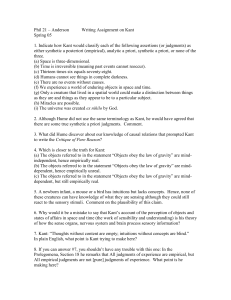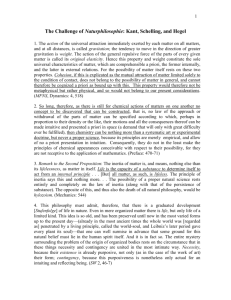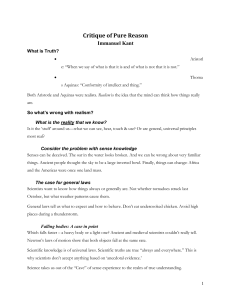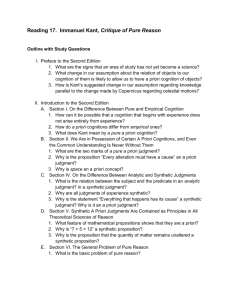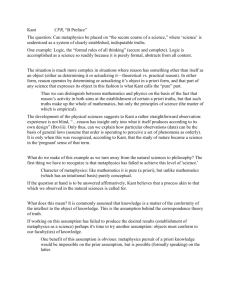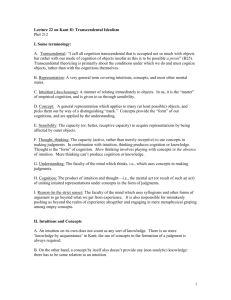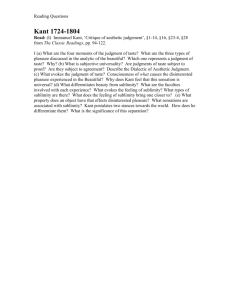KantTakeHome - Wylie Breckenridge
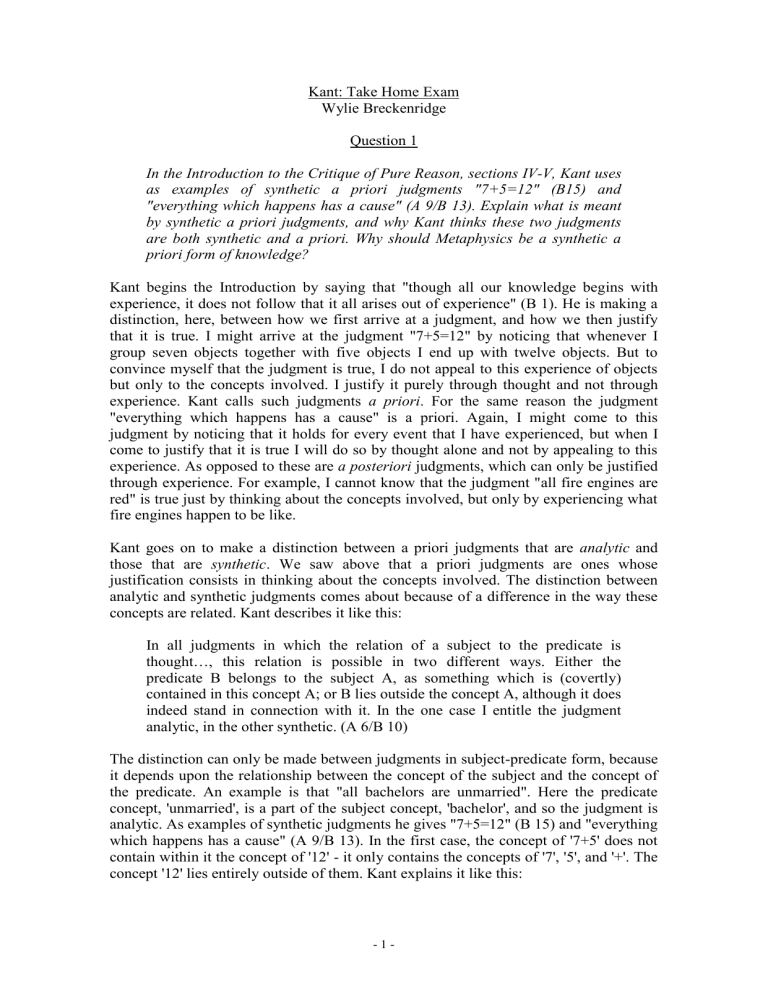
Kant: Take Home Exam
Wylie Breckenridge
Question 1
In the Introduction to the Critique of Pure Reason, sections IV-V, Kant uses as examples of synthetic a priori judgments "7+5=12" (B15) and
"everything which happens has a cause" (A 9/B 13). Explain what is meant by synthetic a priori judgments, and why Kant thinks these two judgments are both synthetic and a priori. Why should Metaphysics be a synthetic a priori form of knowledge?
Kant begins the Introduction by saying that "though all our knowledge begins with experience, it does not follow that it all arises out of experience" (B 1). He is making a distinction, here, between how we first arrive at a judgment, and how we then justify that it is true. I might arrive at the judgment "7+5=12" by noticing that whenever I group seven objects together with five objects I end up with twelve objects. But to convince myself that the judgment is true, I do not appeal to this experience of objects but only to the concepts involved. I justify it purely through thought and not through experience. Kant calls such judgments a priori . For the same reason the judgment
"everything which happens has a cause" is a priori. Again, I might come to this judgment by noticing that it holds for every event that I have experienced, but when I come to justify that it is true I will do so by thought alone and not by appealing to this experience. As opposed to these are a posteriori judgments, which can only be justified through experience. For example, I cannot know that the judgment "all fire engines are red" is true just by thinking about the concepts involved, but only by experiencing what fire engines happen to be like.
Kant goes on to make a distinction between a priori judgments that are analytic and those that are synthetic . We saw above that a priori judgments are ones whose justification consists in thinking about the concepts involved. The distinction between analytic and synthetic judgments comes about because of a difference in the way these concepts are related. Kant describes it like this:
In all judgments in which the relation of a subject to the predicate is thought…, this relation is possible in two different ways. Either the predicate B belongs to the subject A, as something which is (covertly) contained in this concept A; or B lies outside the concept A, although it does indeed stand in connection with it. In the one case I entitle the judgment analytic, in the other synthetic. (A 6/B 10)
The distinction can only be made between judgments in subject-predicate form, because it depends upon the relationship between the concept of the subject and the concept of the predicate. An example is that "all bachelors are unmarried". Here the predicate concept, 'unmarried', is a part of the subject concept, 'bachelor', and so the judgment is analytic. As examples of synthetic judgments he gives "7+5=12" (B 15) and "everything which happens has a cause" (A 9/B 13). In the first case, the concept of '7+5' does not contain within it the concept of '12' - it only contains the concepts of '7', '5', and '+'. The concept '12' lies entirely outside of them. Kant explains it like this:
- 1 -
… if we look more closely we find that the concept of the sum of 7 and 5 contains nothing save the union of the two numbers into one, and in this no thought is being taken as to what that single number may be which combines both. The concept of 12 is by no means already thought in merely thinking this union of 7 and 5; and I may analyse my concept of such a possible sum as long as I please, still I shall never find the 12 in it. (B 15)
In the second case, the concept of 'something which happens' does not contain the concept of 'cause'. In Kant's words:
In the concept of 'something which happens', I do indeed think an existence which is preceded by a time, etc., and from this concept analytic judgments may be obtained. But the concept of a 'cause' lies entirely outside the other concept, and signifies something different from 'that which happens', and is not therefore in any way contained in this latter representation. (A 9/B 13)
The analytic/synthetic distinction applies not only to a priori judgments, but also to a posteriori ones. However, a posteriori judgments can only be synthetic, because in an analytic judgment we have no need to go beyond its concepts to know its truth, and hence no need to resort to experience. Kant says:
Judgments of experience, as such, are one and all synthetic. For it would be absurd to found an analytic judgment on experience. Since, in framing the judgment, I must not go outside my concept, there is no need to appeal to the testimony of experience in its support. (B 11)
Thus Kant's real interest is in the distinction as it applies to a priori judgments. In particular, he is interested in synthetic a priori judgments. Analytic judgments "add nothing through the predicate to the concept of the subject" (A 7/B 11). In an analytic judgment we don't learn anything we didn't already know, even if in a confused way. He refers to them as "explicative". Synthetic judgments, on the other hand, "add to the concept of the subject a predicate which has not been in any wise thought in it, and which no analysis could possibly extract from it…" (A 7/B 11). He describes them as
"ampliative", a term obviously meant to suggest that they increase our knowledge rather than just make it clearer. He sums up his view as follows:
… analytic judgments are very important, and indeed necessary, but only for obtaining that clearness in the concepts which is requisite for such a sure and wide synthesis as will lead to a genuinely new addition to all previous knowledge. (A 10/B 13-14)
It is for this reason that Kant thinks Metaphysics should be a synthetic a priori form of knowledge. It should be a priori because it seeks necessary and universal knowledge, that is, knowledge of judgments that hold necessarily and universally, like the judgment that "the world must have a first beginning" (Kant's example, B 18). (Kant argues elsewhere in the Introduction that necessity and universality can only be a property of a priori judgments.) It should be synthetic because it seeks genuine extension of our knowledge, not the mere clarification of already existing knowledge. Such analysis is the domain of Logic, not Metaphysics. He sums up his view of Metaphysics thus:
- 2 -
For its business is not merely to analyse concepts which we make for ourselves a priori of things, and thereby to clarify them analytically, but to extend our a priori knowledge. And for this purpose we must employ principles which add to the given concept something that was not contained in it, and through a priori synthetic judgments venture out so far that experience is quite unable to follow us… Thus metaphysics consists, at least in intention, entirely of a priori synthetic propositions. (B 18)
Question 2
In the Transcendental Aesthetic, Section II, Kant claims that "Time is not an empirical concept which has been derived from any experience".
Reconstruct and assess Kant's arguments for the claim that time is neither empirical nor conceptual.
Kant gives two main arguments for why time is not derived from experience.
Firstly, if time were derived from experience then experience would have to precede it.
But Kant claims that it is actually the other way around - that time precedes experience.
He says that time is the form that our experience takes, and without it there could be no experience at all. To demonstrate this Kant points out that we can remove appearance from time, but we cannot remove time from appearance. That is, we can think of time as having no appearance, but we cannot think of an appearance that doesn't exist in time.
Kant puts it this way:
We cannot, in respect of appearances in general, remove time itself, though we can quite well think time as void of appearances. Time is, therefore, given a priori. In it alone is actuality of appearances possible at all.
Appearances may, one and all, vanish; but time (as the universal condition of their possibility) cannot itself be removed. (A 31/B 46)
Secondly he considers two of our principles about relations of time: that time has only one dimension, and that different times are not simultaneous but successive. He claims that since we regard these as holding necessarily, time must be something that is given a priori. This is a special case of Kant's general claim, made in the introduction, Section
II, that necessity is a sign of non-empirical knowledge. His idea is that we can only know contingent truths about things that are given to us through experience, and so it is only things which we have access to a priori that we can have necessary knowledge of.
In Kant's words:
These principles cannot be derived from experience, for experience would give neither strict universality nor apodeictic certainty. We should only be able to say that common experience teaches us that it is so; not that it must be so. These principles are valid as rules under which alone experiences are possible; and they instruct us in regard to the experiences, not by means of them. (A 31/B 47)
Kant again gives two main arguments for why time is not a concept.
- 3 -
Firstly, he argues that since time is singular it cannot be a concept. For Kant, a concept is the union of several representations, be they intuitions or other concepts. A concept is a way of bringing together, or unifying, these representations under a single head. The mark of a concept, then, is that we can distinguish other concepts or intuitions as falling under it. But he says that time is not like that - even though it is infinite it is not composed of 'simpler' times. Rather, when we think of particular times or finite intervals of time we are not thinking of components of, but limitations to, the one single time. We cannot think of particular intervals of time except as limitations of the one infinite time, and so the former must depend upon the latter. Kant puts it like this:
Different times are but parts of one and the same time; and the representation which can be given only through a single object is intuition.
(A 31-32/B 47)
The infinitude of time signifies nothing more than that every determinate magnitude of time is possible only through limitations of one single time that underlies it. The original representation, time, must therefore be given as unlimited. But when an object is so given that its parts, and every quantity of it, can be determinately represented only through limitation, the whole representation cannot be given through concepts, since they contain only partial representations; on the contrary, such concepts must themselves rest on immediate intuition. (A 32/B 47-48)
Secondly, he appeals again to the principle that different times are not simultaneous. For him this is a synthetic proposition, because the concept of simultaneity is not contained within the concept of two times. And because it is synthetic it cannot rest on concepts alone - by comparing concepts we can only arrive at analytic judgments; that is, we can only judge whether or not one concept is contained within the other. Synthetic judgments must, then, involve intuitions. Thus, since this principle about the succession of different times is synthetic, time cannot be a concept. Kant puts it like this:
Moreover, the proposition that different times cannot be simultaneous is not to be derived from a general concept. The proposition is synthetic, and cannot have its origin in concepts alone. It is immediately contained in the intuition and representation of time. (A 32/B 47)
Later on in Section II he gives a third argument for time being an intuition rather than a concept:
We represent the time-sequence by a line progressing to infinity, in which the manifold constitutes a series of one dimension only; and we reason from the properties of this line to all the properties of time… From this fact also, that all the relations of time allow of being expressed in an outer intuition, it is evident that the representation is itself an intuition. (A 33/B 50)
His argument here is that since we think about time by drawing it as a line, and since this line is presented to us as an intuition, then time itself must also be an intuition.
That time is neither empirical nor conceptual is important for Kant's account of the possibility of synthetic a priori knowledge. Without intuitions, our judgments would
- 4 -
consist in just the analysis of empty concepts, and so the possibility of synthetic knowledge disappears. With intuitions comes the possibility of synthetic knowledge, but if these intuitions were solely empirical then all of this knowledge would be a posteriori. For a priori synthetic knowledge to be possible we need a priori intuitions.
Kant's claim is that time is one source of such intuitions.
Question 3
At A 68/B 93 Kant describes judgment as "the mediate knowledge of an object, that is, the representation of a representation of it". Reconstruct
Kant's account of the nature of judgment in "Analytic of Concepts", Section
I, explaining what Kant means by the above claim.
To understand Kant's account of judgment, we must first understand his account of representations - the 'raw materials' of judgment. There are two sorts of representations - intuitions and concepts. Intuitions are the 'appearances' of objects. They can be thought of as our first and closest point of contact with them. It is through intuitions that objects are given to us. Concepts are a way of unifying these intuitions. When we form a concept we bring together intuitions, and possibly other concepts, under a single head.
For example, under the concept 'animal' we bring the concepts 'human', 'dog', 'horse', etc. Then under each of these concepts we bring together other concepts and/or intuitions. For example, under the concept 'human' we have the concepts of 'Australian',
'American', etc. In this way, we can unify all of our representations into a hierarchical tree. At the bottom of this tree will be intuitions, and above them will rise concepts in levels of increasing generality. Kant also describes and thinks of concepts as 'functions':
Whereas all intuitions, as sensible, rest on affections, concepts rest on functions. By 'function' I mean the unity of the act of bringing various representations under one common representation. (A 68/B 93)
He thinks of a concept as something that operates on a 'variable' - like a mathematical function or a logical predicate. He says:
But concepts, as predicates of possible judgments, relate to some representation of a not yet determined object. (A 69/B 94)
The 'not yet determined object', here, can be thought of as a variable to which the concept may be applied.
Intuitions are not enough for knowledge. Through them objects are merely given to us, and not thought about. Knowledge of an object arises by judging that its intuition falls under a certain concept, or that a certain concept may be applied to it. For example, my knowledge that 'there is an apple there' arises in the following way. First I have an intuition. This arises from the faculty of sensibility by the imposition of the forms of space and time on sensation. About this intuition I have, as yet, made no judgment, and so have no knowledge. It is just the recognition that 'something is there'. It is the 'not yet determined object' to which concepts may be applied. I then judge that this intuition falls under the concept of 'object', and so judge that 'there is an object there'. Then I judge that of all the concepts that fall under the concept of 'object', the intuition falls under the concept of 'apple'. Thus I arrive at the judgment that 'there is an apple there'.
- 5 -
Note that judgment does not consist in a single representation. An intuition by itself is not a judgment. A concept by itself is not a judgment. It is only by applying a concept to a representation, be it an intuition or another concept, that we make a judgment. That is, judgment consists in forming a representation of a representation. Kant puts it like this:
Since no representation, save when it is an intuition, is in immediate relation to an object, no concept is ever related to an object immediately, but to some other representation of it, be that other representation an intuition, or itself a concept. Judgment is therefore the mediate knowledge of an object, that is, the representation of a representation of it. In every judgment there is a concept which holds of many representations, and among them of a given representation that is immediately related to an object… Accordingly, all judgments are functions of unity among our representations; instead of an immediate representation, a higher representation, which comprises the immediate representation and various others, is used in knowing the object, and thereby much possible knowledge is collected into one. (A 68-69/B 93-
94)
That a judgment is the representation of a representation is important to Kant. One of these, the intuition, gives substance to knowledge. The other, the application of a concept, makes the intuition intelligible. As Kant says:
Without sensibility no object would be given to us, without understanding no object would be thought. Thoughts without content are empty, intuitions without concepts are blind. It is, therefore, just as necessary to make our concepts sensible, that is, to add the object to them in intuition, as to make our intuitions intelligible, that is, to bring them under concepts. These two powers or capacities cannot exchange their functions. The understanding can intuit nothing, the senses can think nothing. Only through their union can knowledge arise. (A 51/B 75)
It is by means of judgment that this union of intuition and concept comes about, and so by means of judgment that we gain knowledge.
- 6 -

